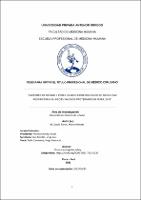Mostrar el registro sencillo del ítem
Factores de riesgo y perfil clínico epidemiológico de dificultad respiratoria en recién nacidos pretérmino en Piura, 2019
| dc.contributor.advisor | Chumacero Aguilar, Mary | |
| dc.contributor.author | Zavala Farías, Marcio Renato | |
| dc.creator | Zavala Farías, Marcio Renato | |
| dc.date.accessioned | 2022-05-04T18:20:20Z | |
| dc.date.available | 2022-05-04T18:20:20Z | |
| dc.date.issued | 2022 | |
| dc.identifier.uri | https://hdl.handle.net/20.500.12759/8909 | |
| dc.description.abstract | Determinar los factores de riesgo de Síndrome de Dificultad Respiratoria en Recién Nacidos Pretérmino del Hospital Santa Rosa II-2 2019 Material y método. Se realizó un estudio de tipo casos y controles, retrospectivo. La población estuvo constituida por 120 neonatos prematuros con una edad gestacional mayor de 32 semanas y menor de 37 semanas, atendidos en el Hospital de Apoyo II Santa Rosa. Se dividió en dos grupos, el primero con 60 neonatos con diagnóstico de síndrome de dificultad respiratoria neonatal (SDR) y el segundo formado por 60 neonatos sin diagnóstico de SDR. En ambos grupos se evaluó los factores de riesgo asociados al diagnóstico de SDR en neonatos registrados en cada historia clínica. Resultados. En el presente estudio se evidenció que las gestantes con presencia de diabetes gestacional aumenta 2.02 veces las posibilidades de tener neonatos con SDR si nacen pretérminos (OR: 2.02; IC: 1.51 – 2.69; valor p<0.001), la presencia de obesidad en la gestación aumenta en 2.2 veces el riesgo de presentar neonatos pretérmino con SDR (OR: 2.2; IC: 1.79 – 2.7; valor p<0.001) y las ITU maternas son factor de riesgo que aumenta en 1.74 las veces de tener SDR en neonatos pretérminos (OR: 1.74; IC: 1.13 – 2.68; valor p=0.011). También se evidenció que los factores que disminuyen el riesgo, fueron los Controles prenatales de 6 a más (OR: 0.53; IC: 0.34 – 0.82; valor p = 0.004), ser de sexo femenino (OR: 0.34; IC: 0.34 – 0.82; valor p <0.001), ser pretérmino tardío (OR: 0.41, IC: 0.3 – 0.56, valor p<0.001)) o tener al menos 1500g de peso ((OR:0.54; IC: 0.39 – 0.73; valor p<0.001). Conclusión. Los factores que aumentaron el riesgo de SDR en neonato pretérmino fueron la presencia de diabetes gestacional, obesidad e ITU. Los factores que disminuyeron el riesgo fueron tener 6 o más CPN, ser de sexo femenino, prematuro tardío y pesar al menos 1500g. | es_PE |
| dc.description.abstract | To determine the risk factors of Respiratory Distress Syndrome in Preterm Newborns of the Hospital Santa Rosa II-2 2019. Material and method. A retrospective case-control study was conducted. The population consisted of 120 premature infants with a gestational age greater than 32 weeks and less than 37 weeks, treated at the Support Hospital II Santa Rosa. It was divided into two groups, the first with 60 neonates diagnosed with neonatal respiratory distress syndrome (RDS) and the second made up of 60 neonates without a diagnosis of RDS. In both groups, the risk factors associated with the diagnosis of RDS in neonates recorded in each medical record were evaluated. Results. In the present study, it was shown that pregnant women with the presence of gestational diabetes increase 2.02 times the chances of having newborns with RDS if they are born preterm (OR: 2.02; CI: 1.51 - 2.69; value p<0.001), the presence of obesity in the gestation increases the risk of presenting preterm infants with RDS by 2.2 times (OR: 2.2; CI: 1.79 – 2.7; value p<0.001) and maternal UTI is a risk factor that increases the times of having RDS in preterm infants by 1.74 times ( OR: 1.74, CI: 1.13 – 2.68, p-value=0.011). It was also shown that the factors that reduce the risk were prenatal check-ups of 6 or more (OR: 0.53; CI: 0.34 - 0.82; p value = 0.004), being female (OR: 0.34; CI: 0.34 - 0.82; p-value <0.001), being late preterm (OR: 0.41, CI: 0.3 – 0.56, p-value <0.001)) or weighing at least 1500g ((OR: 0.54; CI: 0.39 – 0.73; p-value <0.001). Conclusion. The factors that increase the risk of RDS in preterm infants were the presence of gestational diabetes, obesity and UTI. Factors that decreased risk were having 6 or more NPCs, being female, late preterm, and weighing at least 1500g. | en_US |
| dc.description.uri | Tesis | es_PE |
| dc.format | application/pdf | es_PE |
| dc.language.iso | spa | es_PE |
| dc.publisher | Universidad Privada Antenor Orrego | es_PE |
| dc.relation.ispartofseries | T_MEDP_288 | |
| dc.rights | info:eu-repo/semantics/openAccess | es_PE |
| dc.rights.uri | https://creativecommons.org/licenses/by/4.0/ | es_PE |
| dc.source | Universidad Privada Antenor Orrego | es_PE |
| dc.source | Repositorio Institucional - UPAO | es_PE |
| dc.subject | Síndrome de Dificultad Respiratoria | es_PE |
| dc.subject | Recien Nacidos Pretérmino | es_PE |
| dc.title | Factores de riesgo y perfil clínico epidemiológico de dificultad respiratoria en recién nacidos pretérmino en Piura, 2019 | es_PE |
| dc.type | info:eu-repo/semantics/bachelorThesis | es_PE |
| thesis.degree.level | Título Profesional | es_PE |
| thesis.degree.grantor | Universidad Privada Antenor Orrego. Facultad de Medicina Humana | es_PE |
| thesis.degree.name | Médico Cirujano | es_PE |
| thesis.degree.discipline | Medicina Humana | es_PE |
| dc.subject.ocde | https://purl.org/pe-repo/ocde/ford#3.02.27 | es_PE |
| renati.advisor.orcid | https://orcid.org/0000-0001-7132-5230 | es_PE |
| renati.author.dni | 70652717 | |
| renati.advisor.dni | 02657232 | |
| renati.type | https://purl.org/pe-repo/renati/type#tesis | es_PE |
| renati.level | https://purl.org/pe-repo/renati/level#tituloProfesional | es_PE |
| renati.discipline | 912016 | es_PE |
| renati.juror | Peralta Chávez, Víctor | |
| renati.juror | Jara Morillo, Jorge Luis | |
| renati.juror | Peña Camarena, Hugo Gervacio | |
| dc.publisher.country | PE | es_PE |
Ficheros en el ítem
Este ítem aparece en la(s) siguiente(s) colección(es)
-
Medicina Humana [2969]


